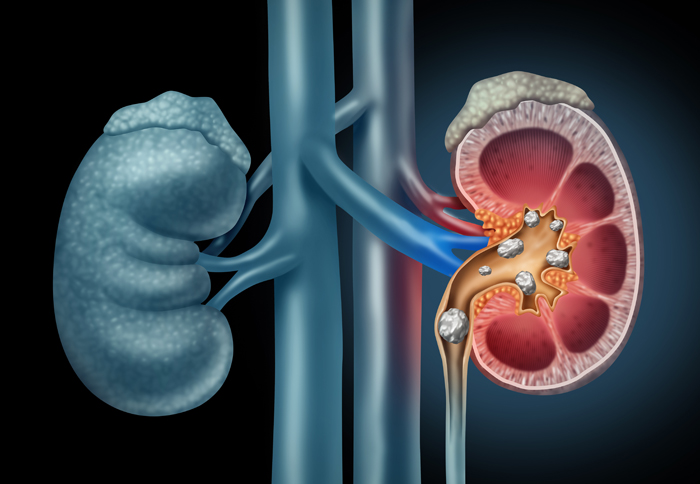Kidney stone Treatment in Kondapur, Hyderabad
A kidney stone is the presence of a stone-like substance in the kidneys. Kidney stone is caused by the lack of urine volume or excess of stone-forming substances in the urine.
Kidney stones are deposits that are in solid-state. They are made up of salts and minerals.

What are the types of kidney stones?
Calcium Oxalate Stones
Calcium oxalate stone is the most common type of kidney stone. These occur when the level of calcium is high and the level of citrate is low in the urine. Consumption of foods high in oxalate causes calcium oxalate stones.
Calcium Phosphate Stones
The abnormal functions of the urinary system cause calcium phosphate kidney stones. Urinary or kidney problems could cause these types of stones. These types of stones often occur along with calcium oxalate stones.
Struvite Stones
Struvite stones are found more commonly in women. It is often caused by a certain type of urinary tract infection. They are usually large in size and may occupy the entire kidney
Uric Acid Stones
Uric acid stones are found more commonly in men. They are caused by dehydration or consuming less quantity of water. They tend to occur in individuals who have a family history of this type of kidney stone.
Cystine Stones
These stones occur when an excessive amount of amino acid cystine gets collected in the urine through a hereditary genetic disorder called cystinuria. Cystine stones usually get formed in the bladder, kidneys, or uterus.
What are the causes of kidney stones?
Here are some of the major factors which cause kidney stones;
- Consuming less amount of water regularly for prolonged periods
- People who have a family history of kidney stones have a higher chance to develop the disease.
- Obesity (being overweight)
- High levels of calcium, oxalate, and phosphorus in the urine.
- Intake of oxalate-rich foods in high amounts such as chocolate, coffee, or beans.
What are the symptoms of kidney stones?
- Sharp pain in the lower abdomen, side, or back
- Experience of pain while urinating
- Sometimes, blood in the urine is also spotted, called hematuria
- Difficulty while urinating or urinating in small amounts
- The smell of urine is bad
- Sometimes, the patient may feel a constant need to urinate
How are kidney stones diagnosed?
- After visiting the medical expert at Apollo Kondapur, the health care professional will diagnose the patient’s medical history, a physical exam will be taken, and tests will be conducted accordingly
- During the physical exam, the health professional may examine the body as well as the symptoms being experienced by the individual
What are the treatments available for kidney stones?
Kidney stones are usually treated based on their size, type and, location. Kidney stones that are smaller in size may pass through the urinary tract without treatment. Drinking a lot of water may help the small kidney stones to pass through the urine easily. Pain medicines can be recommended to help and relieve the sharp pain caused by kidney stones. Large kidney stones may block the urinary tract and cause great pain and are usually treated with surgery.
When to see a doctor?
It is advised to see a doctor when experiencing
- severe pain
- Fever
- Nausea
- Vomiting
- Blood in the urine
Request an appointment at Apollo Spectra Hospitals, Kondapur
Call 1860-500-2244 to book an appointment
How to prevent kidney stones?
- Drinking enough water regularly and being hydrated prevents the occurrence of kidney stones
- Reducing the intake of oxalate-rich foods may lower the risk of getting kidney stones
- Increasing fluid intake by substituting solid foods with juices and water
Kidney stones are a common and treatable disease. In cases of small size kidney stones, by drinking lots of water, the kidney stone may pass through the urinary tract.
Although kidney stones that are large in size, may cause difficulties and pain at the same time, they can be treated and cured under medical guidance.
Yes, intense pain is a symptom of kidney stones.
It depends on various factors including the location and the size of the stone along with the treatment being taken.
Generally, kidney stones are not severe and they may pass through the urinary tract but when the size of kidney stones becomes large then it may be considered severe and may require to be operated through surgery.
Symptoms
Our Top Specialities
NOTICE BOARD
CONTACT US
CONTACT US
 Book Appointment
Book Appointment


.svg)
.svg)
.svg)
.svg)








